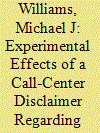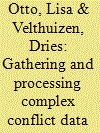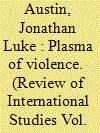| Srl | Item |
| 1 |
ID:
169936


|
|
|
|
|
| Summary/Abstract |
Utilizing a sample drawn to represent the general U.S. population, the present study experimentally tested whether a call-center’s disclaimer regarding limits to caller confidentiality (i.e., that operators would be required to refer calls to law enforcement if callers were to discuss anyone who was a danger to themselves or others) affected disclosures related to a third party’s involvement with terrorist groups, gangs, or such party’s commission of assault and/or non-violent crimes.
|
|
|
|
|
|
|
|
|
|
|
|
|
|
|
|
| 2 |
ID:
177861


|
|
|
|
|
| Summary/Abstract |
Gathering data, analysing it using appropriate tools and interpreting the information results to make knowledge-driven decisions is a good practice for most security practitioners and scholars interested in peace and security. However, analysts and knowledge producers are consistently confronted with an overload of data and contending views of the causes, dynamics and consequence of violent conflict. Perspectives differs and is sometimes dominated by political interests as well as cultural, ideological, and religious/spiritual beliefs. The outcome of the contentious debates, while important to create a reliable body of knowledge for decision-making, tends to cause a limited understanding and inaction.
|
|
|
|
|
|
|
|
|
|
|
|
|
|
|
|
| 3 |
ID:
193300


|
|
|
|
|
| Summary/Abstract |
How do people know how – very practically speaking – to be violent? This article explores that question through a Science and Technology Studies perspective. It does so in order to go beyond the usual location of global political violence at a structural level that attributes its emergence principally to hierarchical orders, formal training, or deep cultural, political, or ideological factors. The alternative explanation offered here draws on Bruno Latour's concept of ‘plasma’ to sketch a theory of how practices of violence are embedded at a distributed ontological level through the historical accumulation of (popular) cultural, textual, technological, and other epistemic objects. In making that claim, I seek to stress how violent knowledge circulates outside the formal domains associated with it (the military, police) and is instead preconsciously accessible to each and every person. To support this argument, the article draws on empirical examples of the use of torture, including interviews conducted with Syrian perpetrators of torture, as well as by tracing the paradoxical entanglements between scientific practice and the practice of torture. I conclude by engaging the field of preventive medicine to speculate on the need to develop modes of violence prevention that appreciate political violence as a population-level sociopolitical problem.
|
|
|
|
|
|
|
|
|
|
|
|
|
|
|
|